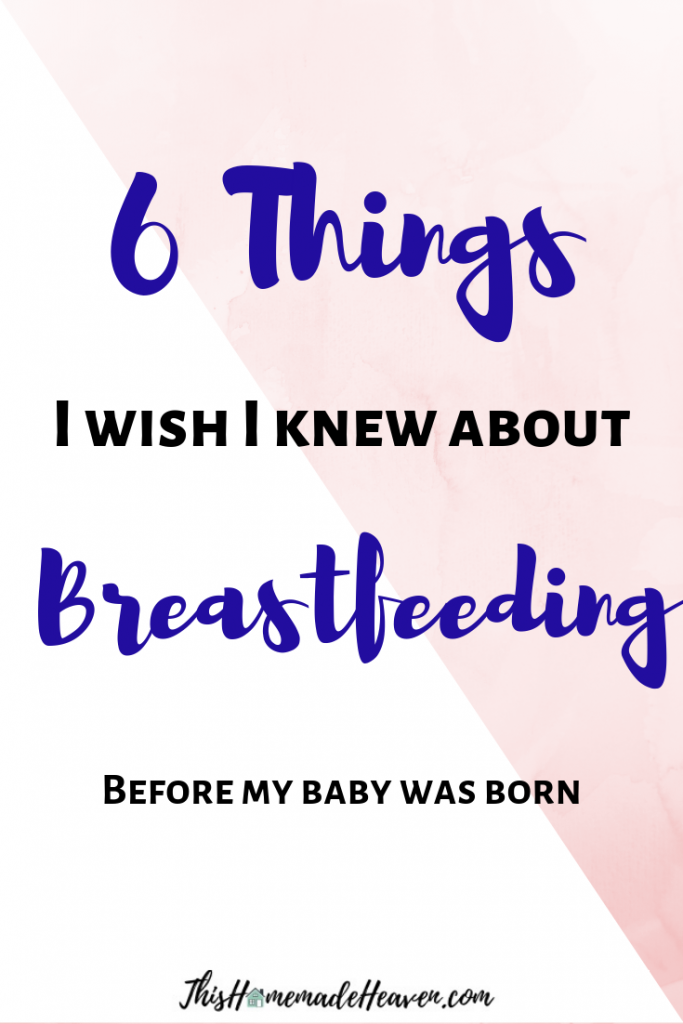Disclosure: This post may include affiliate links through the Amazon affiliate program or other affiliate partnerships. If you click on a link and buy something, I may receive a commission, at no additional cost to you. You can read more boring disclosure details in my disclosure and privacy policy.
It’s 7:30 PM, I’ve just had my baby, and the nurse asks me, “Would you like to try and breastfeed?”
“Of course!”, I reply. I have read books, blogs, and informational articles on breastfeeding. I have talked to the countless women in my life who have breastfed their babies. My head is chock-full of information; I know that I should drink lots of water, I know that she needs to be fed at least every three hours, and I know that the first milk my body produces is a really cool substance called ‘colostrum’.
The nurse helps me bring the baby up to my chest, and then I realize that I have no idea what to actually do. How do I get her to open her mouth? My boob seems huge, how does this thing fit in that tiny mouth? How is she breathing?
This experience I’m sure is common to many women the first time they breastfeed their babies. It is one thing to have head knowledge about breastfeeding, but it is another to experience it for yourself. There are so many things I wish I knew before I gave birth so that I would have more grace for myself as a new mom.
Breastfeeding doesn’t always come naturally.
Don’t get me wrong here; Breastfeeding is ‘the most natural thing in the world’, as the experts say. Breastmilk is the perfect food for your baby, and it is produced by very natural processes.
However, that does not mean that as soon as your baby is born, both of you will know how to breastfeed. I had to learn how to latch my baby on, how to encourage her to open her mouth, and how to get her to stop flailing her hands around so she could latch.
I had help from several lactation consultants, and I remember watching YouTube videos of women demonstrating different nursing positions and ways to hold the breast.
It was shocking to me how something that was supposed to be ‘natural’ felt so foreign. Luckily, babies eat a lot, and with lots of practice, breastfeeding will become more natural over time.
The baby has to learn how to Breastfeed.
Not only did I have no idea what I was doing physically, my baby also had no idea what she was doing. This was perhaps even more of a shock; As a science nerd, I assumed that babies are born with the innate ability to feed because that is what keeps them alive! This could not have been farther from the truth, and as a result, I am extraordinarily grateful for the modern world of breast pumps, nipple shields, and lactation consultants.
Because of one of the medications I was put on during my induction, my baby was extremely sleepy. She would latch on, suck maybe two or three times, then fall back asleep. I learned two weeks after leaving the hospital that my baby was tongue tied, so her tongue didn’t move in a way that efficiently extracted milk from the breast. I also found that after using a nipple shield (per the lactation consultant’s advice) prior to getting the tongue tie released, it took months to teach her how to feed straight from the breast.
Babies have a lot to learn when it comes to feeding. They need to learn how to locate the nipple, that milk comes from boobs (not bottles), and how to calm down so that they can latch on. They have to learn how to move their tongue to extract milk, and they have to learn to coordinate sucking, swallowing, and breathing.
Side note: To any new mothers that have gone to YouTube (like I did!) for help with breastfeeding, please don’t be discouraged! I actually found YouTube discouraging because all of the babies in the videos latched on so easily, and none of them were exhibiting the behaviors that I needed help with with my baby – the flailing arms, the barely-opened mouth, the wobbly head! It wasn’t until much later that I realized the babies in the videos on YouTube are months old – they already know how to eat! Give your baby time, and they will become experts.
Breastfeeding is a partnership.
Because both you and your baby need to learn how to breastfeed, it is important to remember that you are in a partnership, and must work on the breastfeeding relationship together.
I was a very good student in school, and I approach most things in life in an intellectual way. In practically all other areas of life, if I worked hard enough, I could be successful.
Breastfeeding is definitely not like that. It takes work, but you can’t simply study hard and absorb head knowledge. You have to have extraordinary patience, and teach the baby along with yourself.
The breastfeeding relationship reminds me in many ways of a marriage, because it is a relationship that two people have to contribute time and effort in order for it to be successful. The problem is, you can’t have a logical conversation with your baby and explain all of the ways she can improve.
Your baby is entirely relying on you to pull her along on the journey and to teach her everything she needs to know. This is what makes nursing so difficult, but also so rewarding once you are successful.
Breastfeeding can frustrate you and your baby.
Books on breastfeeding love to describe it as ‘wonderful cuddle time with mommy’, in which an irreplaceable bond will develop between you and your baby.
Feeding your baby is definitely good for bonding, and it can be a wonderful time for cuddles, but this is not always the case.
Sometimes the baby will be frustrated at you, because she is having trouble latching on and she’s really hungry. Other times, she may get upset because your letdown isn’t as fast as she would like at the moment. On the opposite end, the baby may become upset because your letdown is too fast, such as first thing in the morning.
On the other hand, despite all of your desires and plans to be the eternally patient mother, you will become frustrated with your baby. She may be a sweet, defenseless little nursing baby, but she will drive you crazy (and/or make you laugh at the absurdity).
Your baby will bite you. She will pull off with your nipple still in her mouth, stretching it further than you ever knew it could stretch. She will slap you in the face (gently – after all, she is a baby). She will pull your hair. She will snap your bra strap.
So you see, you will become frustrated at your little one, but know that everything is part of a phase that will pass. You will continue to develop a strong bond with your baby, such that the small irritations are only a small price to pay for the joy and nutrition that nursing brings you and your baby.
Breastfeeding changes as your baby develops.
While most of this post thus far has been aimed towards mothers of newborns, I think it is important to prepare you for the ways in which breastfeeding will change as your child grows and develops.
When you first begin, breastfeeding is all about you and the baby learning how to breastfeed, as we’ve talked about already.
As a newborn, your baby will sleep a lot and it is a challenge just to get her to stay awake long enough to eat. She may appear ‘milk drunk’ at the end of a feeding, and be totally relaxed.
As your baby grows, she may stop acting ‘milk drunk’ after you feed her. When this happened to me, at first I thought that it meant that she was still hungry or that there was a drop in my supply. It took me a while to realize that she was simply waking up!
Eventually, your little bundle will become more observant of the world around her. When this happens, you may find that it’s hard to nurse in public or anywhere anything interesting is happening and begin to confine yourself to quiet rooms to nurse.
My baby has even gone through a phase where she didn’t want me to talk while I was feeding her. As soon as I starting speaking, she would unlatch and turn her head to stare at me. The same went for my husband; she became super distracted if he walked into the room and started talking to me while I was nursing.
One day, she occasionally pulled off the breast to coo at me before resuming eating, while for others it may be that their baby has trouble nursing anywhere but home.
Your baby will go through developmental leaps constantly; sometimes it seems like they change every day. Every baby will develop and behave differently, and your breastfeeding relationship will change as a result.
Breastfeeding is beautiful.
It really is hard to describe the joy I felt the first time my baby successfully nursed directly from me (after weeks of exclusive pumping). I was so excited to see the milk in the corners of her mouth, and almost cried when she was milk drunk afterward.
It is such a beautiful thing to be able to provide nourishment for your baby and develop a unique bond. There is something special about knowing you are another person’s entire world.
I know I mentioned some of the hardships and irritations that come with breastfeeding, but I hope you realize this is all in the most good-natured way. Those minor irritations are a small price to pay for the amazing experience of nursing.
For those of us that are able to breastfeed, we need to remember that it is a wonderful privilege. Some women are never able to breastfeed, can’t because of a medical reason, or have to switch to formula or exclusive pumping once they go back to work.
I am so grateful every day for the ability to feed my baby girl, and I am so grateful that I persevered through all of the many, many challenges… but more on that later!
Leave me your thoughts…
What is something you wish you knew about breastfeeding before you had your baby? I love hearing other women’s experiences and how they overcame their challenges. Leave me a comment below!
Subscribe





